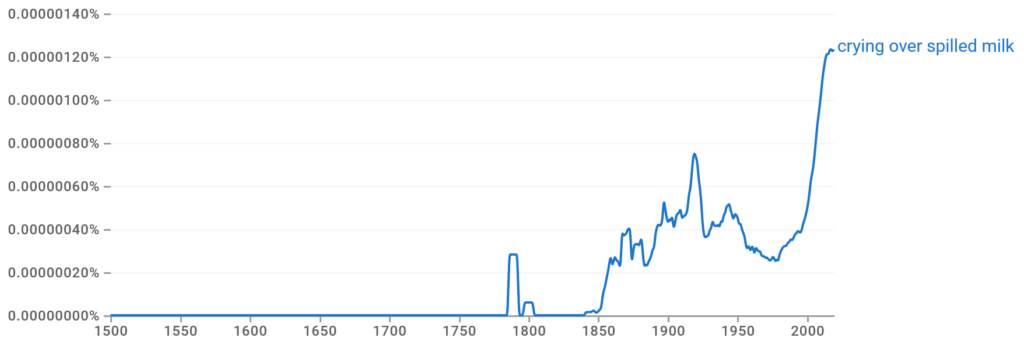Crying over spilled milk is an idiom that means expressing regret or frustration over something that has already happened and truly can’t be changed. This idiom highlights the futility of worrying about past and irreversible events, like having a complete breakdown over the fact that you burned the roast for dinner.
Idioms such as crying over spilled milk are fixed expressions whose meanings are not directly deducible from the individual words used. Instead, they convey a figurative rather than a literal meaning. They are essential to the English language because they help us express complex emotions and situations succinctly, but only when used correctly.
So, in this article, I’ll cover the origins, literal and figurative meanings, variations and synonyms, and practical uses of this idiomatic expression, plus some helpful examples. Keep reading to learn more about the idiom crying over spilled milk, and test your newfound knowledge with the quick quiz at the end. Let’s go!

What Does the Idiom Crying Over Spilled Milk Mean?
The idiom crying over spilled milk means regretting or distressing about a past event, especially when the event is minor or inconsequential.
According to the Cambridge Dictionary, the idiom cry over spilled milk means “to feel sorry or sad about something that has already happened and is used to emphasize that this is not helpful.”
We often use this phrase to advise someone not to be upset over minor setbacks or past events that can’t be undone. It’s a call to focus on the present and the future rather than dwell on bygones.
The idiomatic expression is commonly invoked in conversations to offer perspective, especially when someone’s super upset over trivial or irreversible matters.
As a mom, I always say this to my kids, especially my youngest, who never seems to have a handle on her emotions. She wears them on her sleeve, and when the slightest inconvenience happens, she loses her mind.
I have to don my gentle parenting hat and calmly remind her that nothing is worth crying over spilled milk. There’s nothing she could have done differently, so let’s just figure out a solution.
Literal Meaning vs. Figurative Meaning
The literal meaning of crying over spilled milk is just an image of someone actually crying over a glass of milk that has been accidentally spilled—a pointless act since the milk can’t be put back in the glass. If you think this phrase can’t be used literally, you’re wrong. Back during my breastfeeding days, I once spent all day pumping so I could stock the fridge with bottles because I was about to head out on a work trip.
Somehow, before transferring it all into bottles, I knocked over the container and spilled the breastmilk all over the floor. I bawled like a baby but eventually laughed when I realized that I was quite literally crying over spilled milk.
Figuratively, the idiom crying over spilled milk symbolizes the unnecessary stress or regret over any situation beyond repair. It’s a metaphorical encouragement to just buck up, accept certain things, and move on.
Variations of the Idiom
The classic phrase remains largely unchanged in its usage, but variations do exist to suit different contexts:
- It’s no use crying over spilt milk (British English)
- Crying over a spilled glass
- Crying over a bowl of spilled milk
- No weeping for shed milk
How Is the Crying Over Spilled Milk Idiom Commonly Used in Context?
This idiom finds its place in various scenarios, from casual conversations to more formal advice. It’s a versatile phrase that can lighten the mood or offer consolation.
In the following sections, explore the diverse applications of this expressive phrase, discover real-world examples highlighting its usage, and gain practical tips for incorporating it effectively into your language.
What Are the Different Ways to Use the Crying Over Spilled Milk Idiom?
- Everyday conversations: To console someone over a minor mistake. “I know you’re upset you missed the bus, but it’s like crying over spilled milk at this point.”
- In business settings: To move past a failed deal. “The publishing contract didn’t work out, but there’s no point in crying over spilled milk.”
- Personal development: To encourage moving on from past errors. “You didn’t stick to your diet today, but don’t cry over spilled milk; just start fresh tomorrow.”
What Are Some Tips for Using the Crying Over Spilled Milk Idiom Effectively?
- Use it as a friendly reminder or consolation, not as a dismissal of someone’s feelings.
- It works best in situations where the issue at hand is relatively minor or irrevocable.
- Be mindful of the tone to ensure it comes across as empathetic rather than dismissive, especially when communicating via text or email when nuance isn’t often conveyed.
Where Can You Find Examples of the Crying Over Spilled Milk Idiom?
Aside from the thousands of GIFs using the idiom to make digital communication more fun and relatable, you can find examples of the phrase used in books, movies, and media.
One of my favorite authors, Erin Johnson, wrote a cozy fantasy book about witches and vampires and used a clever variation of the phrase as its title: Crying Over Spelled Milk.
It’s also a notable quote that was once said by Benjamin Franklin.
You can find the phrase used all over the news and media outlets, like in these few examples:
“That’s just [the] nature of the beast, you can’t cry over spilled milk.” (BET)
While U.S. Rep. Seth Moulton’s favorite beverage is milk, the Salem Democrat was “not crying over spilled milk” that he did not make the debate stage in Miami for the first round of 2020 Democratic presidential debates on June 26 and June 27. (The Daily News)
What Is the Origin of the Idiom Crying Over Spilled Milk?

The expression crying over spilled milk originated in European folklore, with early versions appearing in writings as far back as the 17th century.
James Howell was a historian and writer who created the book of Proverbs called Paramoigraphy back in the 1600s. In it, he lists this idiom, but it’s worded as, “No weeping for shed milk.” The idea behind the phrase is the same, so James is credited with coining it.
How Did the Idiom Evolve Over Time?
Initially used in a more literal sense, the phrase has transitioned to a figurative expression, widely recognized as advice against unnecessary lamentation. It gained popularity in English through its frequent use in literature and common speech.
What Are Some Related Terms to the Crying Over Spilled Milk Idiom?
Synonyms can help us convey the same message or idea but in different words. Try using some of these alternatives to the phrase crying over spilled milk.

Synonyms
- Dwelling on the past
- Lament
- Bewail
- Complain
- Beating a dead horse
- Regret
- Making a mountain out of a molehill
Antonyms
- Looking on the bright side
- Moving forward
- Letting bygones be bygones
Crying Over Spilled Milk Idiom: Test Your Knowledge!
Choose the correct answer.
What Have We Learned about the Crying Over Spilled Milk Idiom?
This idiomatic expression crying over spilled milk teaches us the importance of perspective and emotional resilience. It refers to unnecessary regret or distress over past mistakes. It underscores the notion that dwelling on irreparable incidents is unproductive.
I trust that my guide has been instrumental in equipping you with the knowledge to use this idiom effectively. For those eager to discover more intriguing idioms, you’ll find a treasure trove of guides on our site. Feel free to explore and expand your repertoire!
Related Articles:
